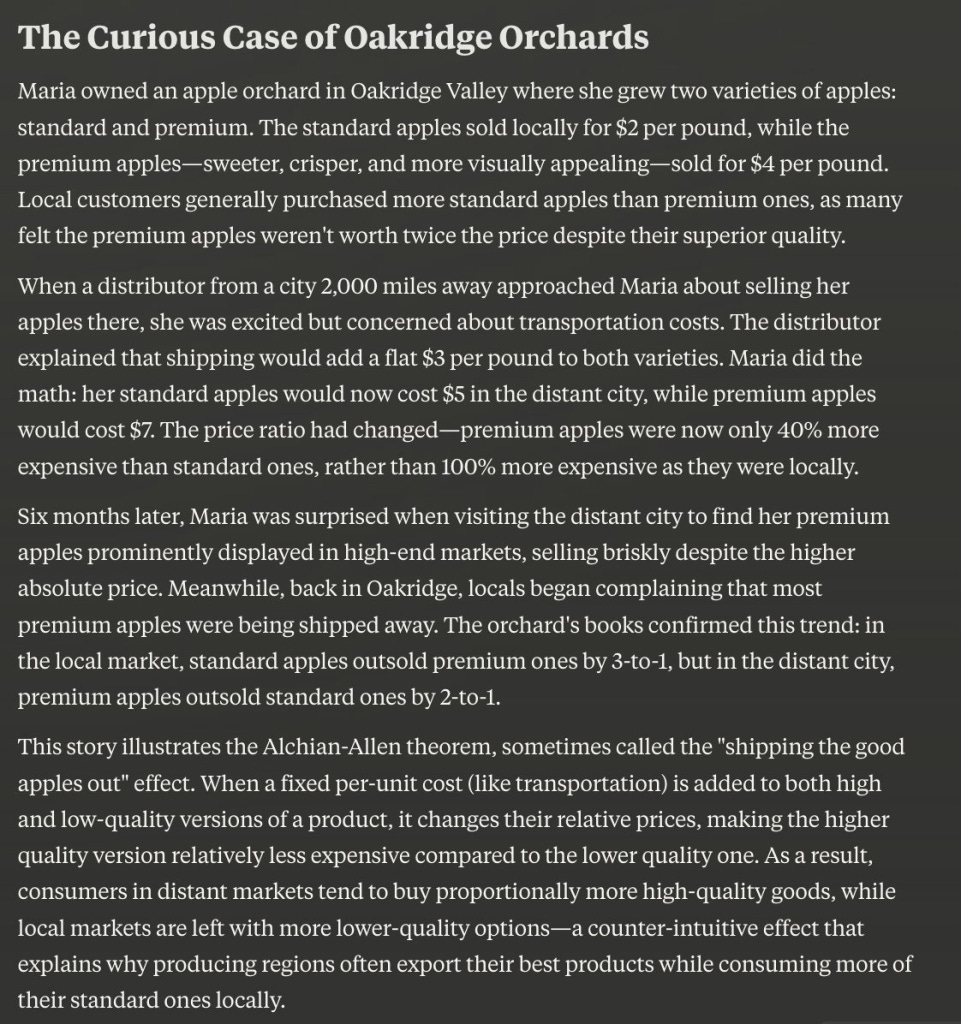Infinite Lessons
The Alchian-Allen theorem, referenced in this tweet, is a favorite of mine to bring up whenever we Punekars lament the non-availability of Alphonso mangoes in the summer (IYKYK), and we have of course covered it on these pages.
But back then, in July of 2019, the way I covered these abstruse theorems was by thinking about which theorems would be fun to include, and then looking up the relevant Wikipedia article and sharing it. What if, instead, I could have written fun little short stories about each of them?
"Try to identify a somewhat niche principle or idea from the discipline of economics. This should be a principle or idea that early undergraduates wouldn't have heard of but late graduate students would have. It should be a relatively obscure but interesting and useful to know about nonetheless. Once you have identified such a principle, think of a story that could be used to illustrate your chosen principle. This should be an illustrative 3 paragraph story that would fully explain the principle or idea you've chosen but without naming the principle or idea itself. You can then name the principle or idea at the end of the story and explain it and how it is illustrated by the story in a single paragraph."
This is a great prompt because:
The phrase "from the discipline of economics" can be changed to suit your requirement. "Cellular biology" would be one of my top choices, and in a tip of my hat to the author of the piece, so would "philosophy", perhaps narrowed by geography, time period, or maybe both.
You can specify your level of expertise, given your knowledge about the subject. Amanda goes for "late graduate students", you might prefer your cuppa to be brewed to a different strength (also, careful: late graduate students stage of expertise might mean different things in different parts of the world, and there's no saying how AI interpret this specification. That can on balance be a good thing, of course.)
This is my favorite phrase in the prompt: "relatively obscure but interesting and useful to know about nonetheless", because that is pretty much how I approach everything that I try to read. This resonated a lot!
Choose to add specifications about the derivation of the theorem (if applicable) to your prompt. Or maybe add in some specifications about empirical illustrations. Choose to make the idea fit in an autobiographical sketch of the person who cam up with the idea (that is, explain not just the idea, but also give some idea of the setting in which the whole thing took place).
"Apply that idea to utopian science fiction", I might say on days on which I'm craving something a little different.
The overall point, being, of course, that "What should I read in this field?" is a question you should be thinking very hard about yourself, and using prompts built on ideas like these to discover, at your own pace, and in a format of your choice, the subject you wish to get better at.
Two other points worth noting:The world's most customizable and indefatigable tutor is at your command, 24x7, at INR 2300/-, and you'd do well to hire them.
Follow Amanda Askell on Twitter. Please.


